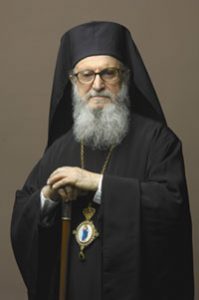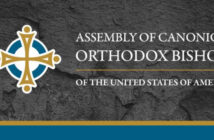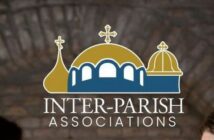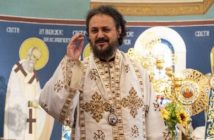
His Eminence, Geron Archbishop Demetrios
Source: Assembly of Canonical Orthodox Bishops of the USA
Thursday, October 06, 2016
ADDRESS OF THE CHAIRMAN
HIS EMINENCE ARCHBISHOP DEMETRIOS OF AMERICA
at the 7th Assembly of Canonical Orthodox Bishops
of the United States of America
Detroit, MI
(October 4-6, 2016)
***
Your Eminences, Your Excellencies and Your Graces, most beloved and respected brothers and Hierarchs of the Assembly of the Canonical Orthodox Bishops of the United States of America, welcome to the 7th Annual General Assembly.
Having approached and partaken in the Holy Eucharist as members of the Body of Christ, we convene here in Detroit, Michigan. It is a city whose people have experienced the results of decades of neglect, isolation, and abandonment, but now steadily move forward on the path of transformation towards a renewed life. I cannot help but reflect upon the idea of transformation in our case. We truly need a transformation in Christ, with Christ, and for Christ leading to unity, holiness and effective service. And if this is so, we must, following the Apostle Paul, strive to know Christ and the power of His resurrection and the sharing of His sufferings (Phil. 3:10), and following the Apostle Peter, with a sincere love for the brethren and from a pure heart let us love one another intensely (1 Peter 1:22).
Our mission is not new. Indeed, it began with the great commission of Christ to His disciples when He said to them, As the Father has sent me, even so I send you (John 20:21). In our times, our predecessors strove to become imitators of the disciples and apostles, and strove to present a unified Orthodox voice to society. Their passion to promote the truth in an organized pan-Orthodox fashion was formally acknowledged in 2009 with the Pre-Conciliar Decision in Chambésy by all Orthodox autocephalous Churches, which formally established regional Episcopal Assemblies around the world. And just a few short months ago, the value of these Episcopal Assemblies was acknowledged by the Holy and Great Council. What began as Christ’s mandate progressed into a vision and a grassroots effort, and is now formally an important institution of the Orthodox Church. When we speak together as an Assembly of Bishops, we do so with the authority of the Church; we do not speak as jurisdictions or merely as representatives but as a single body of Orthodox Hierarchs who are committed to sharing the transformative light of Christ with our local society.
We have much work in front of us; nonetheless, we are most grateful for the challenge and opportunity to labor together and find ways to present an Orthodox Christian message to our society in the most effective way. With this in mind, allow me to highlight a number of matters that may assist us in our work.
1. The Holy and Great Council of the Orthodox Church
Let me start with the Holy and Great Synod that convened on the island of Crete last June (June 18-26, 2016).
As you know, the decision for a Pan-Orthodox Synod was taken by representatives of the autocephalous Orthodox Churches in 1961, fifty-five years ago, and during a special meeting on the island of Rhodes, Greece (September 20-October 5, 1961). Several meetings related to the aforementioned decision followed. They were pan-Orthodox in composition under the title Διορθόδοξος Προπαρασκευαστική Επιτροπή (Inter-Orthodox Preparatory Committee) or Προσυνοδική Προπαρασκευαστική Διασύσκεψις (Pre-Conciliar Preparatory Consultation). Some dates of such meetings are 1963 (Rhodes, Greece), 1964 (Rhodes), 1966 (Belgrade, Yugoslavia), 1968, 1976, 1982, 1986, 1990 and 1993 (all in Geneva, Switzerland.
The work of the Committees or Consultations was the formation of a list of topics to be discussed by the Pan-Orthodox Synod when it convenes and for the preparation of the texts corresponding to the selected topics.
Significant events in Europe and the Middle East caused a temporary halt in the above process.
In 2008 (October 10-12, 2008), during a Synaxis in Constantinople of the Heads and representatives of all Autocephalous Orthodox Churches, the work for the preparation of the Pan-Orthodox Synod resumed. Thus six years later (March 6-9, 2014), during the Synaxis of the Heads of the Autocephalous Churches in Constantinople, the historic decision was taken for the convening of the Holy and Great Synod of the Orthodox Churches in the Spring of 2016, in the Church of Saint Irene (place of the Second Ecumenical Council) in Constantinople.
The final Pre-Synodal Holy Synaxis of the Primates and representatives of all autocephalous Orthodox Churches took place in Geneva this year (January 21-26, 2016). During this Synaxis three important things occurred: a) The location of the Holy and Great Synod changed from Constantinople, Turkey to Crete, Greece for well known reasons, b) the Regulations for the work in the Synod were discussed and approved, and c) the texts of the final six topics were discussed in detail and approved with some modifications.
The Holy and Great Synod, after 55 years of preparation finally convened as scheduled from Sunday of Pentecost (June, 2016) to Sunday of All Saints (June 26, 2016). Ten out of fourteen autocephalous Orthodox Churches participated, namely: the Ecumenical Patriarchate of Constantinople, the Patriarchate of Alexandria, the Patriarchate of Jerusalem, the Patriarchate of Serbia, the Patriarchate of Romania, the Church of Cyprus, the Church of Greece, the Church of Poland, the Church of the Czech and Slovak Republics, and the Church of Albania. Four out of fourteen autocephalous Orthodox Churches did not participate in the Holy and Great Synod, namely the Patriarchate of Antioch, the Patriarchate of Moscow, the Patriarchate of Bulgaria, and the Patriarchate of Georgia.
We have had the great honor, twelve of us from our Assembly, to be part of the Holy and Great Synod and to experience a week of dignified, honest, free, and productive discussions in a spirit of love, unity, and mutual respect.
I don’t know of any other event in recent Church history that attracted the attention of more people and which opened the Church to such praise and criticism. Indeed, if nothing else, we can certainly say that the Council helped us gain a better perception of who we are and we have become more aware of the need to constantly strive for unity.
For some, the Council was not the expression of Orthodox unity they envisioned or for which they hoped. This is understandable. The agenda, mission, work, and documents of the Holy Council do, however, reveal the Orthodox Church’s commitment to conciliarity. Certainly, the absence of four local Orthodox Churches from the Council was and remains a painful event in many respects. This, however, does not stand as a sign of our disunity, but encourages us to remain patient with one another and to cultivate unity by all means. In spite of our own weaknesses and shortcomings, we must all insist on remaining in and growing in our unity in Christ.
Our primary task, as Hierarchs of the United States, is not to argue over the Council in Crete. We don’t have the luxury for such debates. As shepherds of the Lord’s flock we must remain bound to one another; steadfast in our mission; and committed to overcoming any challenge and utilizing all opportunities in a fraternal, truthful, and conciliar manner. We are an Assembly of Orthodox Bishops; there is nothing anyone can say or do to change this. We are one in Christ. If we don’t live up to our responsibility to work as one body, dear brothers, we leave the faithful at the mercy of a cold and unforgiving world. And we can rest assured that society will not ask whether someone is Greek or Bulgarian; Russian or Ukrainian; Serb or Romanian; Georgian or Antiochian; convert or cradle Orthodox. Our people will all eventually become prey to attack and ridicule. My prayer is that we, under the present conditions and challenges, can all recommit ourselves to one another as an Assembly of Bishops.
2. Committee Renewal
The fact that we are all here today is evidence of our commitment to clearly identify our common goals and to work hard at achieving them together, not for our own self-interests, but rather, for the good of the Church and society. To do this, we must finally put our Assembly’s committees to their proper use. It is not enough to claim that we have committees tasked with matters related to the youth and pastoral care, liturgy and monasticism, canonical and legal matters, ecumenical and church-world relations. We must search for ways to empower and authorize these committees. It is time to maximize our cooperation in a systematic and effective way so that we can establish a solid conciliar foundation for our work. Till now, most of our committees have either struggled to initiate their work, or they have had a good start and eventually lost their steam. There are too many people of good will looking to serve the Church through the Assembly. Our committees are the appropriate vehicle by which we may channel our people’s energies to the glory of God. We recognize that everyone is busy and that each of us has his own local mission, but we must search for ways to align our local diocesan work with the work of the Assembly, and it is obvious that our committees may assist us.
I especially would like to thank His Grace Bishop Maxim, who has served as the Coordinator of Committees for the past seven years. He has received quite a challenging task, and I would like to reassure him, on behalf of all, of our commitment to assist him in this sacred work. During our present meeting we will have the chance to review our committees—their composition, their mission, and effectiveness. I encourage us all to be as honest and critically constructive as we can during this process. Consider the practical needs of your committee’s work and what resources you need to be more effective. After seven years we ought to know by now what is working and what needs further adjustment. Before moving on, I would like to also acknowledge and thank, on behalf of all of our brothers, Mr. Alexei Krindatch, who, as a dedicated servant of the Church has labored to find points of contact between individual Hierarchs, metropolises, dioceses, and parishes and the greater Assembly of Bishops.
3. Agencies of the Assembly
Yet another resource available to us is our Assembly Agencies. These Agencies predate our Assembly. They went from mere ideas, to grassroots initiatives, to jurisdictional ministries, and finally developed into pan-Orthodox organizations that have impacted the lives of millions of people, from prisons to college campuses, from American citizens to the marginalized, displaced, and refugee person in all corners of the world.
We are very fortunate to have these Agencies doing the work of the Gospel. It is, however, not enough to simply refer to them as Assembly Agencies; we must actually engrave in our minds that they are parts of the Church. They are in many ways the arms of the Church that comfort those in need, that feed the hungry, and visit the sick and imprisoned. If we can think in this way, we will find new ways to support our Agencies and advane the work of the Church.
We are grateful for the coordinating work of His Grace Bishop Gregory, who has served as the Chairman of the Committees on Agencies. This year, with the assistance and oversight of Bishop Gregory, the Assembly will have the opportunity to engage in a meaningful discussion with representatives of our Agencies. We have asked the Agencies to present information on their transformative work, and where appropriate, to pay particular attention to their efforts in the United States.
4. Religious Liberty Forum
Also during this year’s meeting there will be an informational forum dedicated to religious liberty, a topic that is of great concern to us and to our people. It is an issue that affects our local communities in the United States and even the global Orthodox Church. In the past few years we have struggled as an Assembly to make sense of the ever-evolving trends in society that have affected religious freedom, often in a negative way. We have attempted to issue pastoral responses to a number of developments, most recently the Obergefell v. Hodges ruling of the Supreme Court. Unfortunately, it seems that our efforts have fallen short. We still struggle to understand and express the importance of religious freedom as a fundamental human right. Moreover, at times we forget that violations of religious liberty impact the lives of Orthodox Christians around the world, and that religious freedom is important to people of all faiths, and even individuals who do not associate with any particular faith. I do believe that there is great room for growth and improvement. For this reason, the Assembly Executive Committee agreed on the importance of having a forum on religious liberty during our general assembly. We have invited three experts in the field to present to us some of the fundamentals. Thus, there will be a presentation on Religious Liberty and the First Amendment; b) Religious Liberty and the Media; and c) International Religious Freedom. My hope is that this forum will serve as the foundation for responsible and effective engagement in matters of religious freedom. Our Committee for Church and Society ought to build upon what is learned during the forum, and it ought to be prepared to help the Assembly of Bishops not only address matters brought up in the public square, but also develop a long-term course action.
5. Acknowledgments of Bishop Basil and Metropolitan Antony
In closing, dear brothers, it would be remiss of us if we failed to acknowledge the closing of a particular chapter of our Assembly’s history. For the past seven years, His Eminence Metropolitan Antony of the Ukrainian Archdiocese and His Grace Bishop Basil of the Antiochian Archdiocese have served as our Assembly Treasurer and Secretary respectively. While the majority of us have focused most of our attention on our own ministries, Bishop Basil and Metropolitan Antony have dedicated enormous amounts of time to the work of the Assembly of Bishops. They have executed their responsibilities not only with dignity and integrity, but also with humility, patience, and love. They have labored with amazing zeal for our assembly and they have worked collaboratively with others, at times with little support from their brothers, because they strongly believed that their service in the Assembly is a blessing from God. For this, the rewarding words of Christ,well done good and faithful servant (Matt 25:21) fully apply in their case. Your Eminence and Your Grace, thank you for your superb work and for always finding ways to transcend that which divides us; thank you for your ethos of service. Thank you for who you are.
At the end of their second three-year term, it is our responsibility to elect a Secretary and a Treasurer who may follow in their footsteps, who may serve with the same dedication, who may labor to bring us all closer to one another.
6. Closing Remarks
Before closing, let us extend our heartfelt gratitude to His Eminence Metropolitan Joseph and to Bishop Anthony for hosting the celebration of the Divine Liturgy at the Antiochian Basilica of Saint Mary. I would also like to acknowledge and welcome our newest brother, Bishop Irinej, who was recently elected by the Holy Synod of the Church of Serbia to serve as the bishop of the Diocese of Eastern America of the Serbian Orthodox Church in North America, and who was enthroned on Saturday, October 1st. Your Grace, we welcome you and look forward to incorporating your care and experience in the life of our Assembly. Moreover, we would like to extend our prayers and wishes to a young clergy who will shortly enter the rank of the episcopacy. Bishop-elect Irinei Steinberg, as many of us know, was elected by the Church of Russia to serve, following his upcoming ordination, as the Bishop of Sacramento and Vicar of the Western American Diocese of ROCOR. Your Grace, Bishop-Elect Irinei, as you settle into your new role, please do not forget the need to lead the faithful through an example of Christocentric service and sacrifice.
We offer praise and glory to our Lord Jesus Christ for the abundance of His love. Truly, we are blessed. Truly, now that we have come together once again as brothers in Christ, the words of Saint Paul the Apostle resonate in our hearts more than ever, Who shall separate us from the love of Christ? I am sure that neither death, nor life, nor angels, nor principalities, nor things present, nor things to come, nor powers, nor height, nor depth, nor anything else in all creation, will be able to separate us from the love of God in Christ Jesus our Lord (Romans 8: 35-39). Repeating the magnificent doxology from the book of the Apocalypse of John we exclaim in unison: blessing and glory and wisdom and thanksgiving and power and might to the ages and ages! Amen (Rev. 7: 12).



